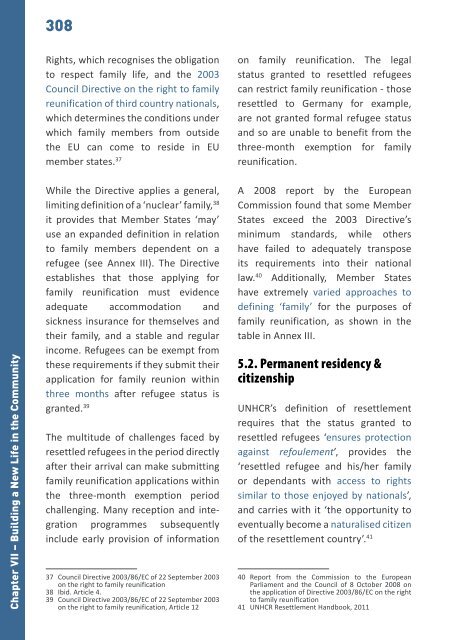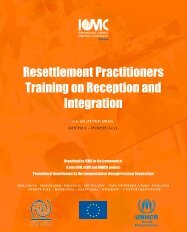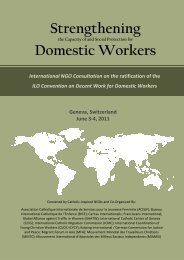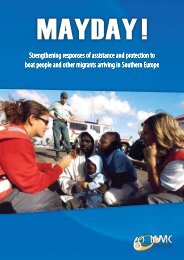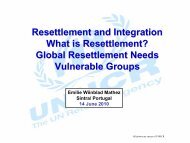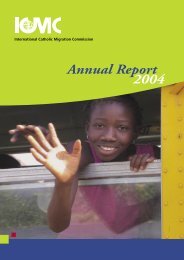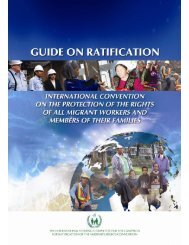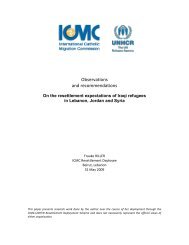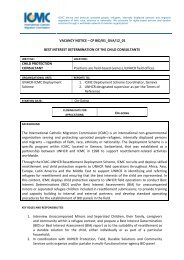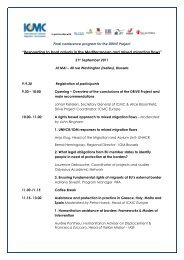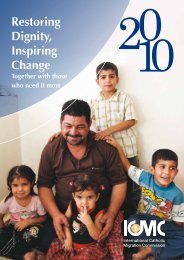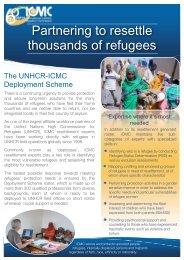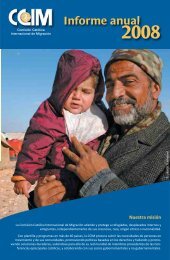ICMCEUROPE WelcometoEurope.pdf (5.89 MB)
ICMCEUROPE WelcometoEurope.pdf (5.89 MB)
ICMCEUROPE WelcometoEurope.pdf (5.89 MB)
You also want an ePaper? Increase the reach of your titles
YUMPU automatically turns print PDFs into web optimized ePapers that Google loves.
308<br />
Chapter VII – Building a New Life in the Community<br />
Rights, which recognises the obligation<br />
to respect family life, and the 2003<br />
Council Directive on the right to family<br />
reunification of third country nationals,<br />
which determines the conditions under<br />
which family members from outside<br />
the EU can come to reside in EU<br />
member states. 37<br />
While the Directive applies a general,<br />
limiting definition of a ‘nuclear’ family, 38<br />
it provides that Member States ‘may’<br />
use an expanded definition in relation<br />
to family members dependent on a<br />
refugee (see Annex III). The Directive<br />
establishes that those applying for<br />
family reunification must evidence<br />
adequate accommodation and<br />
sickness insurance for themselves and<br />
their family, and a stable and regular<br />
income. Refugees can be exempt from<br />
these requirements if they submit their<br />
application for family reunion within<br />
three months after refugee status is<br />
granted. 39<br />
The multitude of challenges faced by<br />
resettled refugees in the period directly<br />
after their arrival can make submitting<br />
family reunification applications within<br />
the three-month exemption period<br />
challenging. Many reception and integration<br />
programmes subsequently<br />
include early provision of information<br />
37 Council Directive 2003/86/EC of 22 September 2003<br />
on the right to family reunification<br />
38 Ibid. Article 4.<br />
39 Council Directive 2003/86/EC of 22 September 2003<br />
on the right to family reunification, Article 12<br />
on family reunification. The legal<br />
status granted to resettled refugees<br />
can restrict family reunification - those<br />
resettled to Germany for example,<br />
are not granted formal refugee status<br />
and so are unable to benefit from the<br />
three-month exemption for family<br />
reunification.<br />
A 2008 report by the European<br />
Commission found that some Member<br />
States exceed the 2003 Directive’s<br />
minimum standards, while others<br />
have failed to adequately transpose<br />
its requirements into their national<br />
law. 40 Additionally, Member States<br />
have extremely varied approaches to<br />
defining ‘family’ for the purposes of<br />
family reunification, as shown in the<br />
table in Annex III.<br />
5.2. Permanent residency &<br />
citizenship<br />
UNHCR’s definition of resettlement<br />
requires that the status granted to<br />
resettled refugees ‘ensures protection<br />
against refoulement’, provides the<br />
‘resettled refugee and his/her family<br />
or dependants with access to rights<br />
similar to those enjoyed by nationals’,<br />
and carries with it ‘the opportunity to<br />
eventually become a naturalised citizen<br />
of the resettlement country’. 41<br />
40 Report from the Commission to the European<br />
Parliament and the Council of 8 October 2008 on<br />
the application of Directive 2003/86/EC on the right<br />
to family reunification<br />
41 UNHCR Resettlement Handbook, 2011


